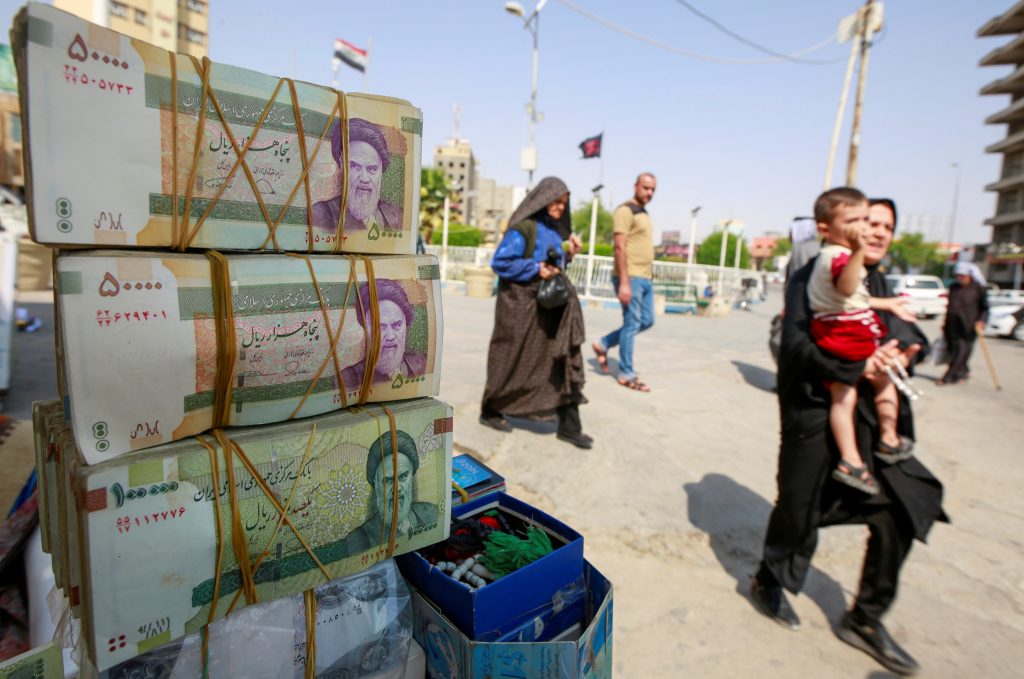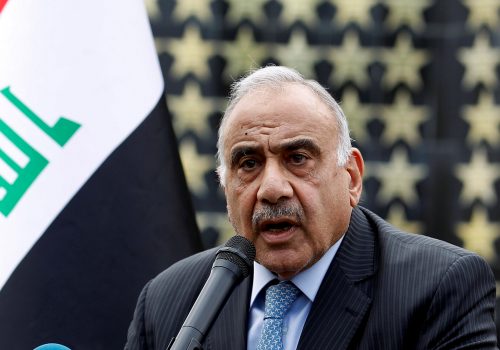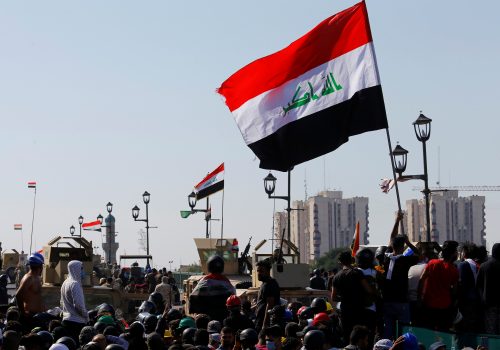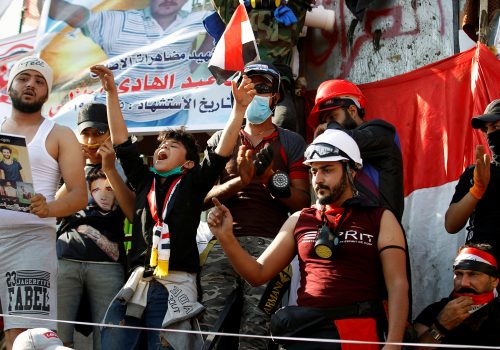Ongoing violent protests in Iraq have shaken the fragile stability of the country, as well as Iran’s carefully constructed geopolitical strategy for its neighbor and historic rival.
On Sunday, the Iraqi parliament accepted the resignation of Prime Minister Adel Abdul-Mahdi, triggering what is certain to be a contentious period of political jockeying. Even if Mahdi’s successor is also seen as “pro-Iran,” however, Tehran will not be in a position to cheer because its ability to openly influence Iraq has become more limited. Iran is also facing its own economic and political pressures.
It is not a revelation that for Iran, Iraq has been the first line of defense and the foundation of a comprehensive security policy. However, geopolitical calculations and “hard” security are not the only reasons for Tehran to maintain close ties with Baghdad. There are also crucial economic and environmental issues, such as access to drinking water and the impact of dust storms originating in Iraq. Tehran accuses Iraq of poor environmental management resulting in a higher frequency of sandstorms, which cause economic and political difficulties especially in Iran’s majority ethnic Arab Khuzestan province, where residents face periodical shortages of both electricity and water. Harsh weather conditions have also forced a suspension of oil production in Iran several times.
Only close cooperation between Baghdad and Tehran can mitigate these problems. Possible solutions include planting particular plant species in order to stabilize sand dunes and stop erosion. Other activities to reduce desertification include better water management, planting more trees and enriching the soil with nutrients. Some of these actions require international help.
Due to the financial disparity between Iran and Saudi Arabia, Tehran’s long-term plan to control Iraq economically will come under huge pressure.
Regarding the economy, Iran has openly confirmed that it wants Iraq to become one of its main economic partners. At least in theory, Iraq could become not only an importer of Iranian goods but also a gateway to the world markets due to re-export. To avoid sanctions, Iranian products would be sold internationally as “made in Iraq;” this strategy is reportedly used by Belarus which re-exports banned Western goods to Russia.
Moreover, a stable, credible and cooperative Iraq—as well as a stable Syria —are required if Iran wants to accomplish a pipeline project that would connect these three states. The project was proposed a decade ago but remains only on paper due to the Syrian civil war, US sanctions and other financial constraints. Close cooperation is also needed for Iran and Iraq to jointly develop various oil and gas fields.
Although in recent years Iran has succeeded in achieving deep influence within the Iraqi state as demonstrated in leaked Iranian intelligence reports, Tehran cannot assume that Baghdad is willing to submissively and uncritically accept potential expansion of this influence especially in light of the anti-Iran sentiment demonstrated in the recent protests which included the burning down of Iran’s consulate in Najaf. One red line for Iraq is any return to the Algiers Agreement of 1975 in which Saddam Hussein accepted a delineation of the Shatt-al-Arab (Arvand Rud) favorable to Iran in return for the Shah abandoning Iraq Kurds.
Another example was the strong Iraqi reaction in September 2018 after Iran limited its supply of electricity to Iraq. This decision not only sparked protests in Basra but also incentivized the Iraqi government to sign a deal to receive electricity from Saudi Arabia at a lower price. Saudi Arabia can afford to offer such prices while Iran is unable to match Riyadh’s financial capabilities.
Iraq is also turning to another Iranian rival, the United Arab Emirates. In June 2018, the UAE’s Al-Hilal Oil Company was awarded a contract to develop several oil fields next to the Iraq-Iran border.
Iran has also been hurt by the withdrawal of the United States from the Joint Comprehensive Plan of Action (JCPOA). Due to economic sanctions and ostracism, Iran is unable to heavily invest in other countries, including Iraq, and cannot modernize its own aging energy infrastructure. Therefore, it is highly likely that Iran will be forced to passively observe not only the growing independence of Iraq but also the increasing presence of companies from Saudi Arabia and the UAE in Iraq.
Currently, Iranian involvement in the Iraqi economy is relatively strong, but this trend is likely to be reversed at some point. Due to the financial disparity between Iran and Saudi Arabia, Tehran’s long-term plan to control Iraq economically will come under huge pressure. Tehran has very effective militias, and its ideological narrative is attractive to many Iraqis. However, its economic tools are limited. In fact, the Islamic Republic has no real instrument to oblige the Iraqi government to prioritize its economic ties with Iran over cooperation with the Arab States in the Persian Gulf. In the long run, Iran might not be able to provide tens of thousands of Shiite fighters in Iraq with financial support. Without them, Tehran’s strategic goal of ruling from a back seat will be questioned. This scenario is already familiar in Africa, where Iranian interests have been pushed out by Riyadh and Abu Dhabi, which use their greater cash resources to persuade local governments not to do business with Tehran.
In summary, the current unrest is just one factor demonstrating emerging challenges for Iran in Iraq. Despite its powerful internal problems and crisis of statehood—deepened by the US invasion in 2003—Iraq is a country with an old culture and national self-awareness. Regardless of their political views and religious beliefs, Iraqis want a sovereign Iraq, not a subordinate to Iran or any other state.
Robert Czulda is an assistant professor at the University of Lodz, Poland and a former visiting professor at Islamic Azad University in Iran, the University of Maryland and National Cheng-chi University in Taiwan. He is the author of Iran 1925 – 2014: From Reza Shah to Rouhani. Follow him on Twitter: @RobertCzulda.
Related Content
Image: Iranian rials are seen at a market in the holy Shi'ite city of Najaf, Iraq September 22, 2019. REUTERS/Alaa al-Marjani



